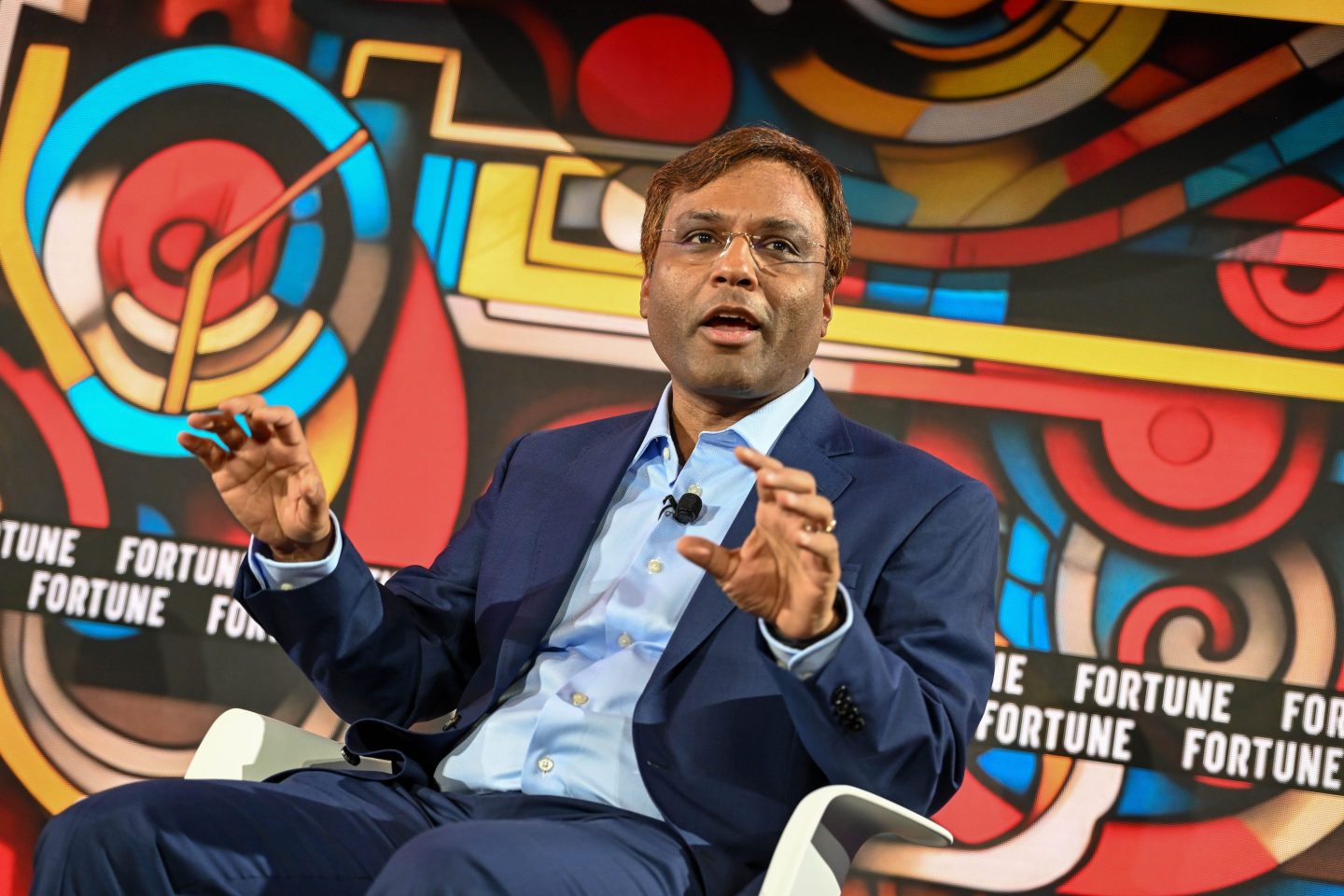Good morning, Data Sheet readers. Cisco delivered third-quarter revenue growth that was on the high end of analysts’ expectations. Uber hired a high-level Google executive. Plus, marketing software startup Percolate—which counts Mattel and Unilever as customers—raised another $40 million. Read on for Thursday’s news.
If you find this newsletter useful, share this link for today’s edition and encourage your colleagues to subscribe. Thanks for spreading the word!
TOP OF MIND
Meet former Google exec Nikesh Arora, SoftBank’s heir apparent. In the nine months he has led SoftBank’s investment strategy, Arora has orchestrated at least nine high-profile deals—including a $100 million stake in geolocation software company Banjo. Earlier this week, he was named president. The likely successor to SoftBank founder Masayoshi Son discusses his investment strategy with Fortune’s Adam Lashinsky,
TRENDING
Chambers triumphant during his last Cisco earnings call. The networking giant managed a 5% revenue increase for its third quarter, reaching $12.1 billion. “All this garbage about new players coming in, and software coming in, and white label killing our approach was entirely wrong,” he told analysts. Now, it’s up to new CEO Chuck Robbins to maintain the momentum.
Senators push for faster drone commercialization. New Jersey’s Cory Booker and North Dakota’s John Hoeven think more businesses should be able to test applications, while the FAA figures out how to regulate the technology.
Intrigue at Uber? The ride-sharing startup hired President Obama’s former advisor David Plouffe to head communications and policy less than one year ago. Now, it’s bringing on Google’s Rachel Whetstone to take over the role. IPO speculation abounds.
THE DOWNLOAD
'People analytics' can capture rich feedback. Are managers ready?
Corporate culture is often held up as a key differentiator of fast-growing, disruptive companies. Hence the rising interest in so-called “people analytics” software, which helps managers better gauge everything from employee sentiment to productivity.
Well-intentioned efforts to measure workforce engagement, however, can backfire if the feedback falls on deaf ears or managers are slow to address feedback.
“You shouldn’t measure faster than you can act,” said Didier Elzinga, co-founder and CEO of Australian software startup Culture Amp. “If you aren’t making changes every week based on feedback, people will give up. So, frequency is a big deal. You need to capture the data and turn the understanding into action.”
Four-year-old Culture Amp, which closed $6.3 million in Series A financing in late March, is aligned with a veritable who’s-how of innovative technology companies. Its customers range from Adobe and Airbnb to Etsy and GoPro.
“We are excited to back them because there is nothing more important than retaining and motivating key talent at every successful company now,” said Felicis Ventures managing director Aydin Senkut, commenting on his firm’s investment.
Elzinga, who used to run a Hollywood visual effects company, started Culture Amp as a way to improve the employee performance review process. By measuring sentiment more frequently with short surveys, he believes managers can avoid being blindsided by issues that could affect productivity or retention. “Your culture is how you deliver the promise of a brand to the customer,” he said.
How often should the human resources team run surveys? Elzinga dodges a specific answer, saying it depends on the company’s “economy of attention.” In other words, how quickly someone in a position of authority explicitly acknowledges the feedback.
E-commerce upstart Birchbox, which specializes in beauty products, sends out team-level “pulse” surveys quarterly along with longer questionnaires on a semi-annual basis. It has tracked internal engagement since its inception but the data became more critical as the company scaled beyond 100 employees.
“A good example is that we just did a deep dive on resources and drilled down on what tools our team needs to be successful,” said Nicole Fealey, Birchbox’s director of people operations and performance. “We thought they might respond with specific software tools or more human capital, and some responses did point to those, but a high percentage pointed to timely communication on projects that affect them. We are a highly communicative culture, but now we are learning to finetune how and when that happens.”
By the way, Culture Amp has created a series of benchmarks using customer data that measure characteristics that highly engaged organizations share. Prominent in its 2015 report are the following:
- Company seen as a great place to develop
- Confidence in the leaders
- Company effectively directs resources toward company goals
- Open and honest two-way communication
- Leaders that demonstrate people are important to the company’s success
THE PITCH
Percolate, a marketing software startup, raises $40 million to make the CMO’s life simpler
Sales teams have customer relationship management tools to track pipelines. Division heads can consult enterprise resource planning software for insights into production. Finance departments glean all sorts of data from accounting software.
If you think about it, pretty much every corporate function has a software system of record, except for the chief marketing officer and the marketing team. Four-year-old software company Percolate wants to change that, and it just found more investors who believe in its mission.
The four-year-old startup has closed $40 million in Series C financing led by Lightspeed Venture Partners, even though it still has money in the bank from a $24 million round disclosed in March 2014, said co-founder and President James Gross. The infusion brings the New York-based company’s total backing $74.5 million, although the valuation isn’t being made public.
The company’s other backers include Sequoia Capital (which led the last round), GGV Capital, First Round Capital, and Lerer Hippeau Ventures.
Percolate’s software is tough to categorize, because it cuts across content marketing, social media management and applications that manage specific marketing tasks, such as campaign performance. In essence, the startup hopes to provide a single orchestration point where marketers can juggle all literally dozens of marketing and advertising tools; the average Fortune 500 team uses at least 50 of them.
“What we want to provide the CMO is not just performance insights, how the message is performing, we really want to measure and analyze the planning and production process and how we can make it better,” Gross said.
Percolate is finding clients among multinational companies that have multiple brands to manage. It counts more than 200 customers, including seven of the world’s biggest consumer packaged goods companies. Some of its high-profile accounts include ABInBev, Airbnb, General Electric, Johnson & Johnson, Kimberly-Clark, Mattel, and Unilever.
“Percolate continues to execute on a vision that systematizes marketing at a global scale, at a time when brand consistency needs to meet the demands of 24x7, multi-channel communications,” said Lightspeed partner Will Kohler, commenting on his firm’s investment. “Their platform understands the workflows that put marketers firmly in control of their future, and we’re excited to lead this financing.”
In its recent report on “social relationship platforms,” technology analysis firm Forrester Research recommends Percolate as good way to integrate social media efforts into broader marketing strategies. “The platform boasts best-in-class workflow and content creation tools; its Brew content recommendation is the most sophisticated we’ve seen,” the firm writes in its report. That said, the company has room for improvement in sentiment analysis, social network integration (it only monitors Facebook, Twitter and Instagram), and scheduling features.
Because Percolate’s ambition is so broad, its sales team has a lot of positioning to do. Aside from competing with point solutions for content marketing, the company finds itself justifying its strategy vis a vis the marketing “clouds” sold by Adobe, Oracle and Salesforce.
The new funds are specifically earmarked for a hiring spree in San Francisco, where the company plans to triple its headcount to almost 50 people this year. Percolate expects to increase its total workforce from 200 to 300 by yearend. It also plans to recruit for offices in Europe, Asia and Latin America.
ALSO WORTH SHARING
The impact of Toshiba’s latest accounting probe could be less severe than feared. Right now, the company is considering a 7% writedown against its operating profits for the past three years. A resolution isn’t expected until June.
Japanese industrial giant Sharp is getting $1.7 billion from several Japanese banks, to help finance a massive restructuring.
Amazon isn’t worried about Venom, a serious security flaw that could be problematic for cloud service providers.
Despite all the hype over Hadoop, the big data management technology, corporate adoption isn’t exactly setting the world on fire.
Alibaba just signed up a big customer for its mobile payments platform: Wal-Mart Stores, which will use the service in all its Chinese stores by yearend. Closer to home, Wal-Mart is planning an e-commerce service that is very similar to Amazon Prime. Tests are planned this summer.
MY FORTUNE BOOKMARKS
Foursquare returns to its roots in bid to win back users by Jason Cipriani
Zendesk’s new nonprofit aims to do more than just customer service by Jonathan Vanian
Starbucks denies reports its mobile app was hacked by Phil Wahba
Patron is using virtual reality to market tequila. Here’s how by John Gaudiosi
Wanted: Highly skilled tech workers, $100,000-plus salary, no college required by Anne Fisher
Is Facebook a partner or a competitor for media companies? Yes. by Mathew Ingram
ONE MORE THING
AOL CEO Tim Armstrong will be $180 million richer after the Verizon takeover is complete. He’ll have to wait at least a year for most of that money.
MARK YOUR CALENDAR
Annual Global Technology, Media and Telecom Conference: JP Morgan’s 43rd invite-only event. (May 18 - 20; Boston)
MuleSoft Connect: Tie together apps, data and devices. (May 27 - 29; San Francisco)
MongoDB World: Scale the universe. (June 1 - 2; New York)
HP Discover: Trends and technologies. (June 2 - 4; Las Vegas)
Hadoop Summit San Jose: Mainstreaming adoption. (June 9 - 11; San Jose, California)
Red Hat Summit: Energize your enterprise. (June 23 - 26; Boston)
Brainstorm Tech: Fortune’s invite-only gathering of thinkers, influencers and entrepreneurs. (July 13 - 15; Aspen, Colorado)
LinuxCon North America: All about open source. (Aug. 17 - 19; Seattle)
VMworld: The virtualization ecosystem. (Aug. 30 – Sept. 3, 2015; San Francisco)
Dreamforce: The Salesforce community. (Sept. 15 - 18; San Francisco)
Cassandra Summit: Largest gathering of Cassandra database developers. (Sept. 22 - 24; San Francisco)
Workday Rising: Meet and share. (Sept. 28 - Oct. 1; Las Vegas)
Gartner Symposium ITxpo: CIOs and senior IT executives. (Oct. 4 - 8; Orlando, Florida)
Oracle OpenWorld: Customer and partner conference. (Oct. 25 - 29; San Francisco)












